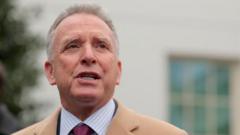The situation sheds light on the complexities of Iran's nuclear ambitions and international relations.
US Proposes New Nuclear Deal to Iran Amidst Rising Tensions

US Proposes New Nuclear Deal to Iran Amidst Rising Tensions
The White House confirms a new nuclear deal proposal from the US to Iran, emphasizing the need for diplomatic engagement.
The US government, under the guidance of President Donald Trump, has put forth a proposal for a new nuclear deal aimed at addressing Iran's escalating uranium enrichment activities. On Saturday, the proposal was relayed to Iranian officials by their Omani counterpart, following a troubling report from the International Atomic Energy Agency (IAEA) which highlighted Iran's increase in enriched uranium production—now exceeding 400kg at a purity of 60%.
White House press secretary Karoline Leavitt asserted that this deal aligns with Iran's best interests, stressing that the United States, through special envoy Steve Witkoff, has outlined acceptable terms. Meanwhile, Iranian Foreign Minister Abbas Araghchi noted that the specific details of the proposal remain undisclosed.
Iran's insistence on the peaceful nature of its nuclear program contrasts sharply with evidence pointing to the potential for weapon-grade capabilities, sparking concerns among world powers. The IAEA's report, regarded by Iranian state media as politically charged, suggests that Iran can produce enriched uranium at a monthly rate sufficient for one nuclear weapon, and could ultimately develop a nuclear bomb in mere months if it chooses.
The historical backdrop includes the Joint Comprehensive Plan of Action (JCPOA) of 2015, which aimed to impose restrictions on Iran's nuclear activities in exchange for sanctions relief. However, Trump's withdrawal from the agreement in 2018 and subsequent re-imposition of sanctions have intensified tensions, leading to Iran exceeding previously agreed limits.
While diplomatic efforts between Iran and the US—mediated by Oman—continue, negotiating divisions remain particularly around Iran’s future enrichment capabilities. The stakes are high; Trump has even hinted at military action if diplomatic initiatives falter.
As the situation evolves, the international community will remain vigilant, weighing the implications of Iran's nuclear developments and the potential for renewed agreements.
White House press secretary Karoline Leavitt asserted that this deal aligns with Iran's best interests, stressing that the United States, through special envoy Steve Witkoff, has outlined acceptable terms. Meanwhile, Iranian Foreign Minister Abbas Araghchi noted that the specific details of the proposal remain undisclosed.
Iran's insistence on the peaceful nature of its nuclear program contrasts sharply with evidence pointing to the potential for weapon-grade capabilities, sparking concerns among world powers. The IAEA's report, regarded by Iranian state media as politically charged, suggests that Iran can produce enriched uranium at a monthly rate sufficient for one nuclear weapon, and could ultimately develop a nuclear bomb in mere months if it chooses.
The historical backdrop includes the Joint Comprehensive Plan of Action (JCPOA) of 2015, which aimed to impose restrictions on Iran's nuclear activities in exchange for sanctions relief. However, Trump's withdrawal from the agreement in 2018 and subsequent re-imposition of sanctions have intensified tensions, leading to Iran exceeding previously agreed limits.
While diplomatic efforts between Iran and the US—mediated by Oman—continue, negotiating divisions remain particularly around Iran’s future enrichment capabilities. The stakes are high; Trump has even hinted at military action if diplomatic initiatives falter.
As the situation evolves, the international community will remain vigilant, weighing the implications of Iran's nuclear developments and the potential for renewed agreements.




















